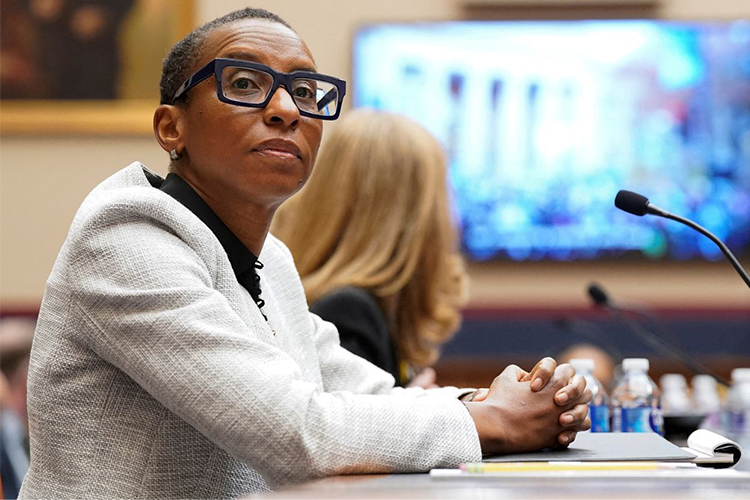
Claudine Gay addresses the Congressional Committee on Education and the Workforce, for which she would later be scrutinized. photo By Ken Cedeno/Reuters
Harvard president Claudine Gay resigns after a plagiarism scandal, sparking mass debate online.
Claudine Gay became Harvard University’s first female African American president only one year ago on July 1, 2023. Recently, however, her time in office was cut short when evidence of plagiarism in her academic publications emerged. On January 2nd, 2024, she officially resigned from her position, however, the circumstances that brought her to the brink may not be as clear-cut as they appear.
Born in 1970 in New York City, Gay completed her undergraduate education in economics at Stanford University and received her PhD from Harvard in 1998. Much of her past research addresses issues relating to race and identity. Gay was a part of the Harvard administration since 2015, ultimately culminating in her becoming the school’s president in 2023. She was the university’s first African American president and was selected out of approximately 600 other highly-esteemed candidates. Her resignation left many people confused as to what she actually did, as well as why it matters that she resigned or even held office in the first place. In general, African Americans are not well represented in academia. In 2016 the National Science Foundation found that only 7% of Ph.D.s were earned by African Americans. Having an African American reach such a high level at such a prestigious institution is, therefore, very meaningful.
The first allegations of plagiarism in Gay’s work arose in December of 2023, circulating on anonymous academic message boards, and around 50 instances of plagiarism were found by various sources and news organizations. These infractions were discovered throughout her academic career at both Stanford and Harvard. Gay’s alleged plagiarism consists mainly of using sentences from other academic works without quotation marks, as well as paraphrasing academic works without citing them in the same paragraph, or, in rare instances, not citing them at all.
After her resignation, Gay published an Opinion Editorial (Op-Ed) in the New York Times where she admitted to poor citation in some instances, but also affirmed the impact and importance of her research, as well as the significance of her position at Harvard. In her Op-Ed, Gay herself stated “despite the obsessive scrutiny of my peer-reviewed writings, few have commented on the substance of my scholarship, which focuses on the significance of minority office holding in American politics.”
Regardless, some people still wonder if her persecution may suggest something more going on behind the scenes. Gay wasn’t only under fire for her alleged plagiarism: she has also been scrutinized for her testimony in a congressional hearing ascertaining the legality of pro-Palestine protests on college campuses, including Harvard.
In her Op-Ed, Gay mentioned that some people may want to take away her position and credibility, but does not specifically state who these people may be. In the past, other college board members have been targeted and threatened with anonymity online, especially those who work with issues of race and discrimination. Victoria Hand, an Associate Professor of Education in Curriculum and Instruction Professor at Colorado University at Boulder, stated that, “there are particular people who have gone after scholars who work on issues of race and equity.” The issues of racial equality and plagiarism will persist across the academic world long after this specific and complex instance has been resolved.